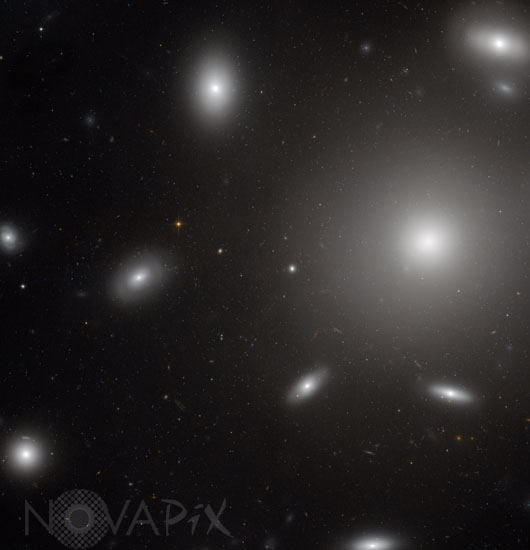Photo Agency - Astronomy - Space - Nature

Galaxies around NGC 4874
author: Nasa/ESA/Novapix
reference: a-gax48-74001
Image Size 300 DPI: 32 * 34 cm
In this NASA/ESA Hubble Space Telescope image, NGC 4874 is the brightest object, located to the right of the frame and seen as a bright star-like core surrounded by a hazy halo. A few of the other galaxies of the cluster are also visible, looking like flying saucers dancing around NGC 4874. But the really remarkable feature of this image is the point-like objects around NGC 4874, revealed on a closer look: almost all of them are clusters of stars that belong to the galaxy. Each of these globular star clusters contains many hundreds of thousands of stars. Recently, astronomers discovered that a few of these point-like objects are not star clusters but ultra-compact dwarf galaxies, also under the gravitational influence of NGC 4874. Being only about 200 light-years across and mostly made up of old stars, these galaxies resemble brighter and larger versions of globular clusters. They are thought to be the cores of small elliptical galaxies that, due to the violent interactions with other galaxies in the cluster, lost their gas and surrounding stars. This Hubble image also shows many more distant galaxies that do not belong to the cluster, seen as small smudges in the background. While the galaxies in the Coma Cluster are located about 350 million light-years away, these other objects are much further out.
Keywords for this photo:
2011 - ABELL 1656 - ASTRONOMY - COMA - COMA BERENICES - ELLIPTICAL GALAXY - GALAXY - GALAXY CLUSTER - HST - HUBBLE SPACE TELESCOPE - NGC 4874 -
Contact : Stéphane Aubin +33-(0)9-51-26-53-76
© Novapix - All rights reserved


